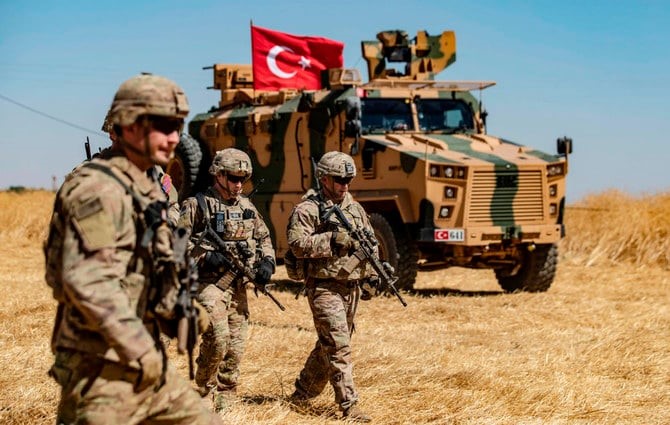The Turkish capital of Ankara is in talks with Moscow about the use of airspace over the contested territory of northern Syria due to a possible Turkish cross-border incursion.
According to experts, Turkey is likely asking Russia for authorization to launch the operation in order to protect the bilateral ties between the two countries, which have been strained by regional conflicts for some time.
On Saturday, Turkish Defense Minister Hulusi Akar said that Ankara had held conversations with Moscow about the details of the operation, including the availability of airspace, and that the long-speculated air and ground action will target the Syrian Kurdish YPG militia.
Along with the United States and the European Union, Turkey designates the Kurdistan Workers’ Party (PKK) as a terrorist organization, and the YPG militia is seen by both as an extension of the PKK in Syria.
Both the PKK and the US-allied Syrian Democratic Forces, commanded by the YPG, have denied any involvement in the November 13 blast in Istanbul that killed six people and injured more than eighty. This accusation came after Ankara hinted at a full-scale ground attack against Syrian Kurds.
Three civilians were killed when rockets fired from northern Syria landed in the Turkish border town of Karkamis in late November, prompting Ankara to speed up its plans to retaliate.
An expert on Turkish-Russian ties named Aydin Sezer has stated that Russia opening Syrian airspace will require approval from the Bashar Assad regime.
With President Recep Tayyip Erdogan recently assuring reporters that Turkey may be “back on track” with Syria, it is clear that Ankara is trying to repair ties with Damascus.
Sezer, however, pointed out that Turkish F-16 jets can hit YPG sites from a long distance.
What Ankara has agreed is the safe departure of Syrian Kurdish forces up to 30 kilometers inside of Syria. He told Arab News that the Kremlin had repeatedly stressed in official declarations that it had “convinced” Turkey against a ground action.
Erdogan proposed a trilateral framework involving Turkish, Russian, and Syrian leaders to discuss cooperative counter-terrorism policy in a phone discussion with Russian President Vladimir Putin last week.
Moscow’s rejection of a Turkish ground action was hinted at when Kremlin spokesman Dmitry Peskov remarked in late November that Russia recognized Turkiye’s security concerns but advised against further escalation.
Three large-scale military operations, Euphrates Shield in 2016–17, Olive Branch in 2018, and Peace Spring in 2019, have already been conducted by Turkey in Syria.
Ankara’s Operation Claw-Sword has been conducting long-range strikes and drone strikes against the Syrian Kurdish militia since late November, drawing condemnation from the United States due to the strikes’ proximity to coalition facilities where American personnel are stationed.
Middle East defense policy specialist Levent Kemal stated that Turkey does not need the opening of Syrian airspace to start an effective operation.
He told Arab News, “Our planes can hit the preset targets from Turkish airspace, without touching Syrian soil.”
But the Kremlin may present some prerequisites, Kemal said, such as providing airspace for an operation in the eastern Euphrates or compelling Erdogan to make a public appearance with Assad sooner rather than later.
He said Tal Rifaat and Manbij are in Turkiye’s sights because they are vital to its plan to create a security corridor along its southern border with Syria. As a result, the cities in Aleppo province are likely to be the primary targets of the forthcoming offensive, despite Russian mediation between Ankara and Damascus.
Speaking at a meeting on December 3 near the Syrian border, Erdogan declared, “attacks will not damper our resolve” and that the security corridor would “definitely” be finished.
On December 11th, Erdogan spoke with Putin on the phone to stress the significance of establishing the security corridor as per an agreement set to take effect in 2019.
Turkey, according to Oytun Orhan, coordinator of Syria studies at the ORSAM research tank in Ankara, has waited months to launch its campaign in Syria to give Russia time to coordinate.
He told Arab News that Russian negotiators had been meeting with Syrian Kurds for the past month to “find a middle ground” and persuade them to pull back from the Turkish border.
Russia tried to help, but Syrian Kurdish officials insisted on maintaining local soldiers near the border, thus their efforts were fruitless.
According to Orhan, this has prompted Ankara to pursue a military solution.
Some use of Syrian airspace, he continued, might be required.
He gave the example of Tal Rifaat, saying that the Turkish military “would need aerial depth” there.
So, in order to carry out this operation as part of a bilateral agreement, we need Russia’s approval.
Otherwise, it might sour relations between Turkey and Russia in other areas and muddy the waters for future agreements, particularly military ones.
For Moscow to approve the use of airspace, he said, “the only requirement would be for Turkiye to submit a withdrawal strategy after the operation and reestablish ties with the Assad regime.”
Source: Arab News


